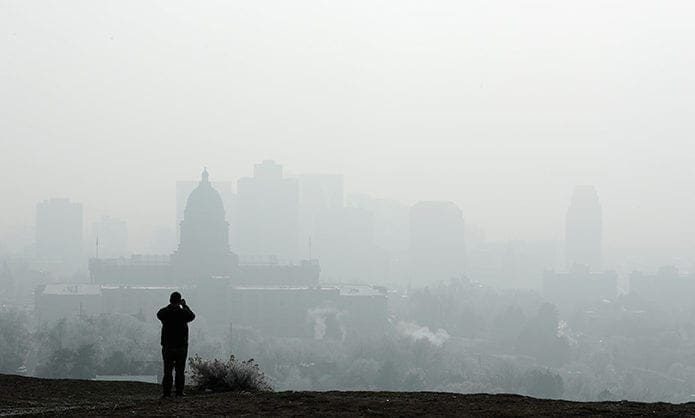 CNS photo/George Frey, Reuters
CNS photo/George Frey, ReutersBill that prices carbon pollution would yield a dividend for everyone
By DENNIS SADOWSKI, Catholic News Service | Published March 6, 2019
WASHINGTON (CNS)—A bipartisan bill that would put a price on each ton of carbon pollution and likely broaden efforts to develop forms of renewable energy is getting wide support from Catholic advocates concerned about climate change.
Seen as key to significantly reducing carbon dioxide and other greenhouse gas emissions by 2050, the Energy Innovation and Carbon Dividend Act introduced in the House of Representatives has become a priority of the U.S. Conference of Catholic Bishops, Catholic Climate Covenant and other organizations.
The bill’s importance was apparent during the recent Catholic Social Ministry Gathering in Washington. The 500 attendees who fanned out across Capitol Hill included the legislation as part of a half-dozen “asks” during the traditional day of advocacy Feb. 5.
Advocates for the legislation stress that it offers a market-based solution to reduce carbon pollution from the use of coal, oil and natural gas. It’s based on the idea that carbon emissions would decline as consumers, industry and energy companies seek cleaner, cheaper energy options.
“It’s the first time since 2009 that a piece of national legislation addressing climate change has been introduced. The significance of it is that it puts a price on carbon,” Dan Misleh, Catholic Climate Covenant executive director, told Catholic News Service. “Everybody in the world agrees if you don’t make carbon more costly, then you’re never going to get people to use less.”
Bishop Frank J. Dewane of Venice, Florida, chairman of the U.S. bishops’ Committee on Domestic Justice and Human Development, was quick to support the bill. He called it a “hopeful sign” that “climate change is beginning to be seen as a crucial moral issue, one that concerns all people.”
“At a time when the dangerous effects of climate change are becoming increasingly apparent, the need for legislative solutions like this is more urgent than ever,” Bishop Dewane said Jan. 25, a day after the bill’s introduction.
The bill has been referred to three House committees. No companion piece has been introduced in the Senate.
The legislation has several components. Most notably, it introduces a carbon fee of $15 per ton of emissions starting in 2019. The fee—some have called it a tax—would rise by $10 per ton a year until being capped at $100 per ton.
All fees collected would be placed into a carbon dividend trust fund for distribution to U.S. households. Monthly disbursements are estimated to total about $3,456 annually for a family of four, according to the pro-environment Citizens Climate Lobby, which supports the legislation and is leading a nationwide push for its passage.
Steve Valk, director of communications at Citizens Climate Lobby, said this measure is supportive of the moral principles Pope Francis outlined in his encyclical on the environment, Laudato Si.
As Catholics, we are called to be concerned about the earth, to act as “good stewards of God’s creation” and work to protect the most vulnerable from the harmful effects of climate change, he said.
He added that the poor won’t have the resources to either move or react as water levels rise or water resources grow scarce.
Valk, who sings as a member of the choir at the Shrine of the Immaculate Conception Church, Atlanta, said people can get involved on climate issues, meeting people who share the passion and interest, by registering at his organization’s website.
The bill exempts military and agriculture emissions from the fee. It also does not regulate carbon emissions for their impact on climate change and would keep the Environmental Protection Agency from doing so for a decade. If carbon reduction goals are not met, then Congress can direct the EPA to regulate them.
Overall carbon emissions are projected to decline by 40 percent during the first 12 years after passage and by 90 percent by 2050. Beyond the taxpayer dividend, the Citizens Climate Lobby projects that the bill will lead to 2.1 million new jobs over 10 years and prevent 295,000 deaths through 2030 because of better air quality.
Rep. Ted Deutch, D-Florida, is the bill’s lead sponsor. He was joined by six Democrats and one Republican—Rep. Francis Rooney of Florida, former U.S. ambassador to the Vatican—in introducing the legislation.
“The idea behind the carbon tax mechanism would be the most efficient, most market-oriented way to start to decarbonize, especially by starting to get rid of coal,” Rooney told CNS.
“To me it makes zero sense not to put a carbon tax on coal,” he said.
Rooney’s stance is a direct rebuff to President Donald Trump, who has made coal a lynchpin in U.S. energy production.
The one-time ambassador said he wouldn’t be swayed by the president’s push to boost coal production. He also said he expects oil consumption to decline not only because of the carbon fee, but also because of improvements in electric vehicle technology that are expected to attract more buyers.
Grassroots work in support of the bill has been underway since Deutch introduced an earlier version during the lame duck session of Congress following the November election.
An Atlanta area member of the U.S. House of Representatives, Rep. Hank Johnson, has signed on to support the measure, said Valk.
Staff Writer Andrew Nelson contributed to this report.